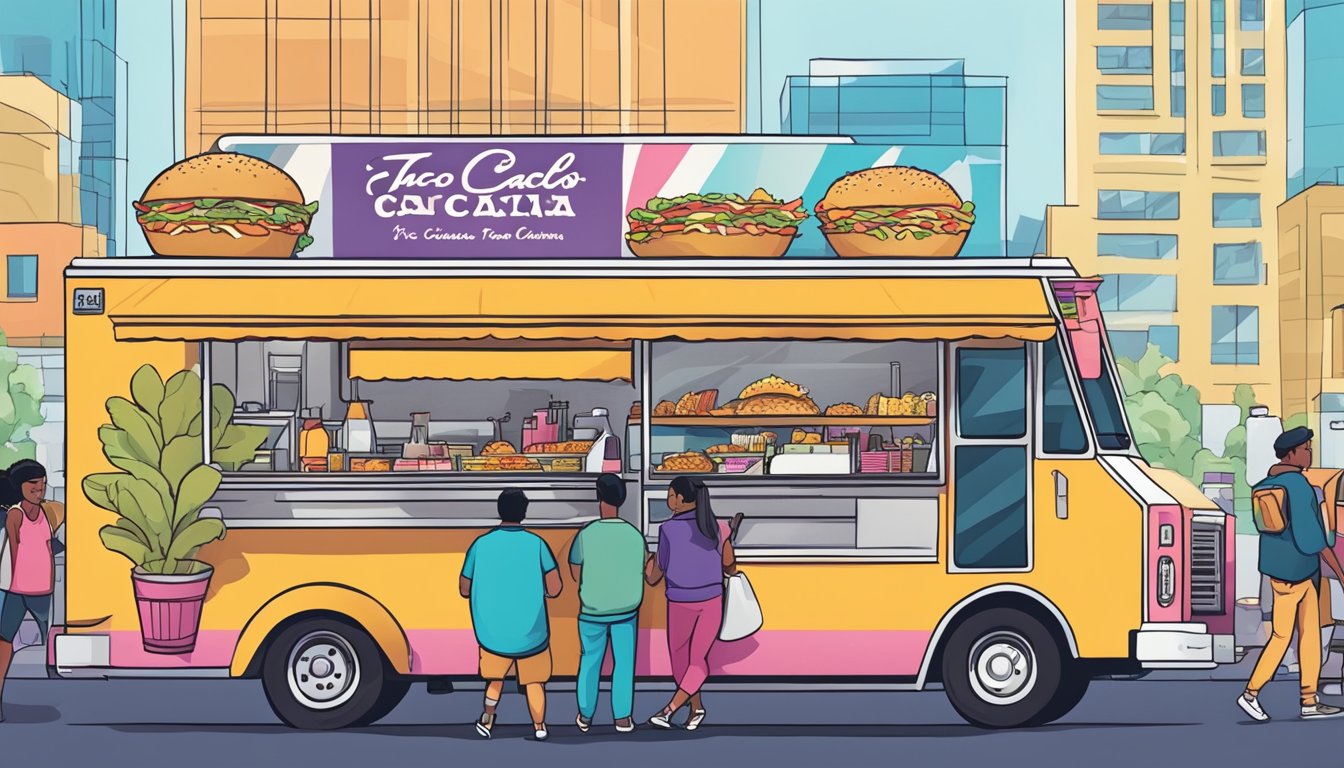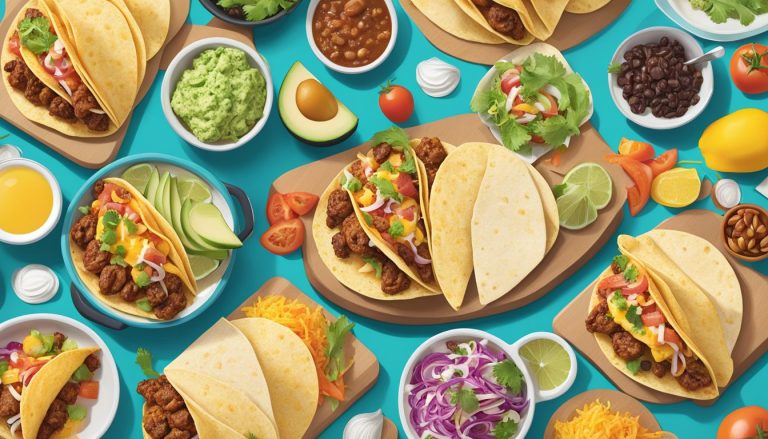Taco Cabana’s journey from a local San Antonio food truck to a major fast-casual franchise is a testament to the power of authentic flavors and strategic growth. Founded in 1978, the restaurant chain has become a beloved fixture in Texas, serving up Mexican-inspired cuisine made fresh by hand. Taco Cabana has recently announced its decision to implement a franchise program, marking a significant milestone in the company’s expansion strategy.
The move to franchising opens up new opportunities for entrepreneurs to join the Taco Cabana brand. With a team that includes experienced franchising professionals like John Ramsay, who has worked with major chains such as Noodles & Company and Jack in the Box, Taco Cabana is well-positioned to support new franchise partners. This expansion model aims to accelerate the brand’s success and growth by leveraging the expertise and resources of franchisees and strategic partners.
Taco Cabana’s franchise program offers potential investors the chance to be part of a well-established brand with a strong focus on fresh, quality ingredients. The company’s commitment to its Texas roots and Mexican-inspired menu has helped it carve out a unique niche in the competitive fast-casual dining sector. As Taco Cabana embarks on this new chapter, it continues to build on its legacy while adapting to the evolving restaurant industry landscape.
Company Background
Taco Cabana’s journey from a single taco stand to a prominent fast-casual chain showcases its evolution in the restaurant industry. The brand’s Texas roots and commitment to Mexican-inspired cuisine have shaped its identity and market position.
Taco Cabana’s Origins and Evolution
Taco Cabana began as a modest taco stand in San Antonio, Texas in 1978. The founders introduced the concept of “patio cafes,” featuring semi-enclosed dining areas with vibrant Mexican decor. This unique approach set Taco Cabana apart from traditional fast-food establishments.
The company expanded rapidly throughout Texas in the 1980s and 1990s. By the mid-1990s, Taco Cabana had grown to over 100 locations across multiple states. The brand’s focus on fresh, made-to-order Mexican and Tex-Mex dishes resonated with customers seeking quality fast-casual options.
Taco Cabana faced challenges and ownership changes but continued to grow. The company’s ability to adapt to market trends and maintain its core values contributed to its longevity in the competitive restaurant industry.
Taco Cabana’s Position in the Restaurant Industry
Taco Cabana has established itself as a prominent player in the fast-casual Mexican food segment. The brand’s menu offers a wide range of Mexican-inspired cuisine, from tacos and fajitas to quesadillas and breakfast options.
Key factors contributing to Taco Cabana’s success include:
- Fresh ingredients and made-to-order meals
- Affordable pricing
- Drive-thru and dine-in options
- 24-hour service at many locations
Taco Cabana’s strong presence in Texas and neighboring states has solidified its position as a regional favorite. The company’s recent move into franchising presents new opportunities for expansion and brand growth beyond its traditional markets.
In the competitive fast-casual landscape, Taco Cabana differentiates itself through its commitment to quality, value, and authentic flavors. This positioning has helped the brand maintain customer loyalty and attract new diners seeking convenient, flavorful meal options.
Franchising Strategy
Taco Cabana’s franchising strategy marks a new chapter in the company’s growth. The program aims to expand the brand’s presence beyond its Texas roots while maintaining its commitment to fresh, Mexican-inspired cuisine.
Development of Franchising Opportunities
Taco Cabana launched its franchising program in 2024, opening doors for entrepreneurs to join the brand. The company assembled an experienced team to lead the initiative, including John Ramsay, a veteran in franchise development.
Ramsay’s expertise from brands like Noodles & Company and Jack in the Box strengthens Taco Cabana’s franchising efforts. The program offers single-unit and multi-unit opportunities, allowing franchisees to choose their level of investment.
Taco Cabana provides comprehensive support to franchisees, including site selection assistance, training programs, and ongoing operational guidance. This approach ensures consistency across locations while empowering franchisees to succeed.
The Appeal of Taco Cabana to Franchisees
Taco Cabana’s value proposition centers on its unique menu and strong brand recognition in Texas. The chain’s fresh, made-by-hand food philosophy sets it apart in the fast-casual Mexican segment.
Franchisees benefit from Taco Cabana’s established supply chain and proven business model. The brand’s adaptability to various markets makes it attractive to multi-brand franchisees looking to diversify their portfolios.
Taco Cabana’s growth potential outside Texas presents an exciting opportunity for franchisees. The company’s commitment to innovation in menu offerings and restaurant design keeps the brand relevant and appealing to customers.
Operational Excellence

Taco Cabana’s growth from a local favorite to a successful franchise hinges on its commitment to operational excellence. The company has focused on streamlining processes, leveraging technology, and strategic market expansion to maintain quality while scaling operations.
Innovations in Kitchen and Operations
Taco Cabana has invested heavily in kitchen innovation to enhance efficiency and consistency. The company implemented automated ordering systems and digital kitchen displays to reduce errors and speed up service. Custom-designed cooking equipment allows for faster preparation of signature items like fajitas and quesadillas.
Operational systems have been refined to optimize inventory management and reduce waste. Taco Cabana introduced a centralized food preparation model for certain ingredients, ensuring uniformity across locations while cutting down on in-store labor costs.
Quality control measures include regular audits and staff training programs. These initiatives have helped maintain food standards as the chain expanded beyond its original Texas base.
Site Selection and Market Strategy
Taco Cabana’s expansion strategy targets suburban markets, particularly in Texas suburbs. The company analyzes demographic data, traffic patterns, and local competition to identify prime locations for new restaurants.
Drive-thru capabilities are a key consideration in site selection, as they contribute significantly to sales volume. Taco Cabana also favors end-cap positions in strip malls for increased visibility and accessibility.
To avoid market saturation, the company spaces out new locations strategically. This approach allows each restaurant to establish a strong customer base without cannibalizing sales from existing units.
Taco Cabana has adapted its restaurant design to suit different market needs. Smaller footprint models have been developed for urban areas, while larger formats cater to family-oriented suburban communities.
Product and Menu Development

Taco Cabana’s success stems from its commitment to authentic Mexican-inspired cuisine and continuous menu innovation. The restaurant chain has built a loyal following through signature dishes and a focus on quality ingredients.
Signature Dishes and Customer Favorites
Taco Cabana’s menu features a range of popular items that have become customer favorites. Breakfast taco boxes offer a convenient and tasty start to the day, packed with flavorful fillings. Street tacos, served on soft corn tortillas, bring the essence of Mexican street food to diners. Combo plates allow customers to sample various dishes in one meal.
The restaurant’s fajitas, quesadillas, and burritos are consistently top sellers. These dishes showcase Taco Cabana’s ability to blend traditional Mexican flavors with Tex-Mex influences. Fresh salsa bars and handmade tortillas add to the authentic dining experience.
Incorporating Quality and Innovation into the Menu
Taco Cabana emphasizes the use of high-quality ingredients in all its offerings. Fresh produce, premium meats, and authentic spices form the foundation of their recipes. The chain regularly updates its menu to reflect current food trends and customer preferences.
Innovation plays a key role in Taco Cabana’s menu development. Seasonal specials and limited-time offerings keep the menu exciting for regular customers. The restaurant also adapts to changing dietary needs, introducing options for health-conscious diners and those with specific dietary restrictions.
Taco Cabana’s culinary team continually experiments with new flavor combinations and cooking techniques. This approach ensures the menu remains relevant and appealing to a diverse customer base.
Marketing and Customer Engagement

Taco Cabana’s success stems from its focused marketing efforts and strong customer relationships. The brand leverages its Mexican-inspired menu and convenient service to build loyalty and drive growth.
Building and Retaining a Strong Customer Base
Taco Cabana prioritizes customer satisfaction through quality food and efficient service. The chain’s drive-thru options cater to busy customers seeking quick, tasty meals. Taco Cabana maintains consistency across locations, ensuring patrons receive the same experience whether visiting a food truck or franchise restaurant.
The brand uses loyalty programs and targeted promotions to encourage repeat visits. Special offers and limited-time menu items keep customers engaged and excited to return. Taco Cabana also gathers feedback through surveys and social media, using this input to refine its offerings and operations.
Marketing Strategies for Growth and Value
Taco Cabana employs a mix of traditional and digital marketing tactics to reach potential customers. Local advertising campaigns highlight the brand’s Mexican-inspired flavors and fresh ingredients. Social media platforms showcase menu items and engage followers with behind-the-scenes content.
The company emphasizes its value proposition, promoting affordable meal options and family-sized portions. Seasonal promotions and meal deals attract budget-conscious diners. Taco Cabana also partners with local events and organizations to increase brand visibility and community involvement.
As it expands through franchising, Taco Cabana provides marketing support to new locations. This includes guidance on grand opening events, local outreach strategies, and ongoing promotional campaigns to build awareness and drive traffic.
Expansion and Growth
Taco Cabana’s growth strategy has evolved from focusing on Texas suburbs to exploring multi-state expansion through franchising. This shift aims to tap into new markets while maintaining the brand’s strong presence in its home state.
Expanding Beyond Texas Suburbs
Taco Cabana has set its sights on expanding beyond Texas. The company plans to grow in nearby states like Arizona, Arkansas, Colorado, and Missouri. This move marks a significant change for the brand, which has primarily operated within Texas for nearly 50 years.
Taco Cabana launched a franchise system to facilitate this expansion. The new program offers multi-unit opportunities to potential franchisees. This strategy allows the brand to leverage local expertise and resources in new markets.
Adapting to New Markets and Dynamics
As Taco Cabana enters new territories, it’s adapting its business model to meet changing consumer demands. The company has recognized the growing importance of drive-thru service, with 60% of its business now coming from this channel.
In response, Taco Cabana is implementing dual drive-thru lanes in its new store designs. This adaptation aims to improve efficiency and cater to on-the-go customers.
The brand is also maintaining its focus on value. Taco Cabana offers an under $5 menu, appealing to budget-conscious consumers in new markets. This strategy helps the company compete effectively in areas where it may not have the same brand recognition as in Texas.
Financial Considerations

Investing in a Taco Cabana franchise requires careful analysis of costs and potential returns. Prospective franchisees must evaluate both initial investment requirements and long-term value propositions.
Investment Requirements for Prospective Franchisees
Taco Cabana’s franchise fee is $45,000. The total initial investment ranges from $1,177,300 to $2,620,600. This covers expenses such as equipment, signage, and seating.
Franchisees need substantial financial resources:
- Net worth requirement: $1,500,000
- Liquid cash requirement: $750,000
Multi-unit development is encouraged. Franchisees should be prepared to open multiple locations.
Analyzing the Long-Term Value for Franchisees
Taco Cabana’s brand recognition in the fast-casual Mexican food sector offers potential for steady customer traffic. The company’s hybrid model between fast-food and full-service restaurants may appeal to diverse consumer preferences.
Franchisees benefit from:
- Established supply chains
- Proven business model
- Marketing support
Long-term success depends on:
- Location selection
- Operational efficiency
- Market demand for Mexican-inspired cuisine
Prospective franchisees should conduct thorough market research and financial projections to assess the potential return on investment in their specific target areas.
Company Culture and Values

Taco Cabana’s success stems from its strong organizational culture and commitment to core values. These principles guide daily operations and shape interactions with customers.
The Importance of Culture in Taco Cabana’s Success
Taco Cabana’s culture emphasizes fresh, handmade Mexican-inspired food and exceptional service. This focus has been key to building a loyal customer base since 1978.
The company values authenticity, quality, and community engagement. These principles have helped Taco Cabana establish itself as a legacy brand in Texas.
As the franchise program expands, maintaining this culture across new locations is crucial. Franchisees are selected based on their alignment with Taco Cabana’s values and vision.
Instilling Values in Operations and Customer Service
Taco Cabana’s values are embedded in its daily operations and customer interactions. The company prioritizes:
- Fresh ingredients and made-to-order food
- Friendly, attentive service
- Clean, welcoming restaurant environments
- Community involvement and support
Staff training programs emphasize these values to ensure consistency across locations. Franchisees receive guidance on implementing these principles in their operations.
Quality control measures help maintain food and service standards. Regular evaluations and feedback systems allow Taco Cabana to uphold its commitment to excellence as it grows.
Legal and Regulatory Environment
Taco Cabana’s transition to franchising brings with it a complex web of legal and regulatory considerations. The company must navigate federal and state laws governing franchise operations.
At the federal level, Taco Cabana is required to comply with the Federal Trade Commission’s Franchise Rule. This regulation mandates the provision of a Franchise Disclosure Document (FDD) to potential franchisees.
State-specific franchise laws add another layer of complexity. Some states require franchise registration, while others have additional disclosure requirements beyond the federal standards.
Taco Cabana’s franchising program must also adhere to various health and safety regulations. These include food safety standards, sanitation requirements, and workplace safety guidelines.
Intellectual property protection is crucial for Taco Cabana’s franchise opportunities. The company needs to secure trademarks, patents, and copyrights to safeguard its brand assets.
Employment laws play a significant role in franchise operations. Taco Cabana and its franchisees must comply with labor regulations, including minimum wage requirements and overtime rules.
Contractual agreements between Taco Cabana and its franchisees form the foundation of their legal relationship. These contracts outline rights, responsibilities, and operational standards for both parties.
Franchise territories and exclusivity rights are important legal considerations. Taco Cabana must carefully define and manage these aspects to avoid potential conflicts among franchisees.
Alcohol Offerings and Licensing

Taco Cabana’s alcohol offerings, particularly margaritas, set it apart from typical fast-food chains. The company navigated complex licensing requirements to serve alcohol at its locations.
Margaritas: A Unique Selling Point
Taco Cabana made waves by introducing margaritas to its menu. These frozen cocktails quickly became a signature item, drawing customers and boosting sales. The chain offers various flavors, from classic lime to fruit-infused options. Margaritas are available for dine-in and drive-thru service at many locations.
Taco Cabana’s margaritas are made with real tequila and served in generous portions. The company often runs promotions centered around its margaritas, such as discounted prices during happy hour or limited-time flavor specials.
Navigating Licensing for Alcohol Sales
Obtaining alcohol licenses for a restaurant chain presents unique challenges. Taco Cabana had to secure proper permits for each location serving alcohol. This process varies by state and local jurisdiction, often requiring separate licenses for on-premise consumption and off-premise sales.
The company invested in staff training to ensure responsible alcohol service. Employees must verify customers’ ages and monitor consumption. Taco Cabana also implemented strict policies for drive-thru alcohol sales to comply with open container laws.
Maintaining these licenses requires ongoing compliance with regulations and periodic renewals. The added complexity has not deterred Taco Cabana, as alcohol sales remain a key part of its business model.
The Future of Taco Cabana

Taco Cabana is poised for significant growth through franchising and adapting to evolving consumer preferences. The brand aims to expand its footprint while staying true to its roots in Mexican-inspired cuisine.
Evolving with Consumer Trends and Market Demands
Taco Cabana recognizes the importance of innovation to meet changing tastes. The chain plans to introduce new menu items that cater to health-conscious diners and those seeking authentic flavors.
Digital ordering and delivery options will likely be enhanced to meet growing demand for convenience. Taco Cabana may also explore plant-based alternatives and sustainable packaging to appeal to environmentally-aware customers.
The brand will need to navigate market saturation in its home state of Texas. This challenge could drive menu diversification and operational improvements to maintain a competitive edge.
Continuing to Scale the Franchise Model
Taco Cabana’s new franchise program opens doors for rapid expansion. The company targets growth in nearby states like Arizona, Arkansas, Colorado, and Missouri.
YTC Enterprises, Taco Cabana’s parent company, brings valuable experience to guide this expansion. Prospective franchisees will benefit from a system built by seasoned operators.
The franchise opportunity allows entrepreneurs to tap into Taco Cabana’s established brand recognition. With over 140 existing locations, the chain offers a proven business model for franchisees.
Taco Cabana’s leadership sees franchising as key to reaching new markets efficiently. This strategy could lead to hundreds of new locations in the coming years.




